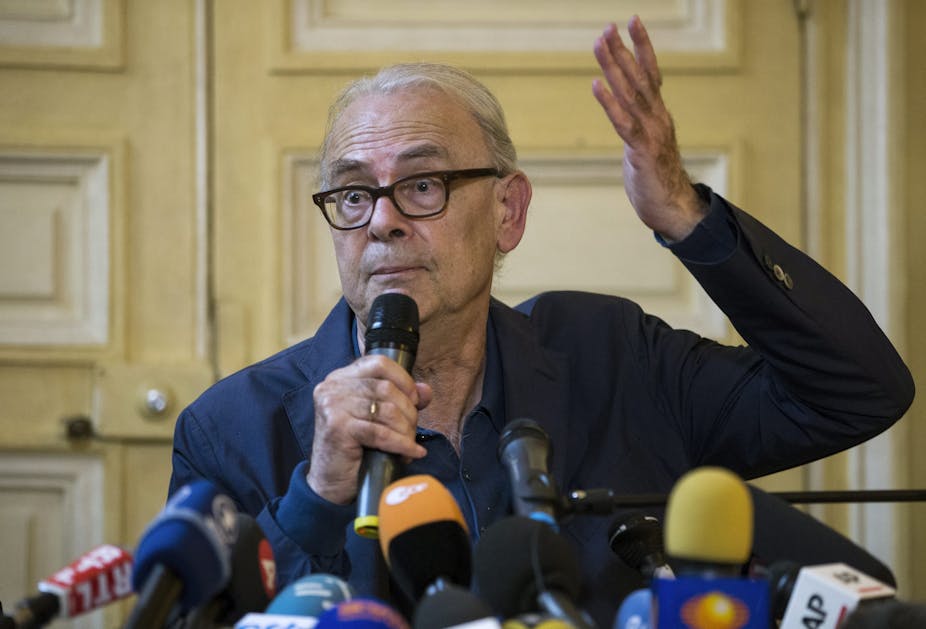There is a tendency in academic job applications to refer to the “prestigious x prize (or fellowship)” that a candidate has been awarded. It’s a phrase that turns out to be self-contradictory, since all it indicates is that the prize or fellowship in question was not quite prestigious enough not to need this rider.
In this sense, the Nobel Prize represents the unqualified gold standard, one recognised globally: no-one refers to the “prestigious Nobel Prize,” since everyone recognises its value. A Nobel Prize is, moreover, one award that writers themselves tend to welcome in an unqualified manner.
Peter Carey said recently that “a life lusting after prizes is bound to be unhappy”. By contrast, the biographer of C.P. Snow chronicles how the British author hankered after the Nobel Prize upon the completion of his Strangers and Brothers sequence of novels.
The story is told of William Golding taking buoyantly to his horse and riding around the Wiltshire countryside after his Nobel had been announced in 1983.
Authors particularly cherish the Nobel Prize because it represents in their eyes the best chance of being granted the kind of immortality writers always tend to seek, without having to die first.
At the same time, the roll-call of winners since the prize was first awarded in 1901 to Sully Prudhomme (who?) reveals there have been some curiously bad choices as well as some more respectable ones. It’s difficult to make a real howler when judging the Nobel Prize for Physics or Chemistry since the importance of scientific discoveries can be more readily validated.
The award of the 1962 Nobel Prize for Medicine to Cambridge biologists Francis Crick and James D. Watson for their discovery of DNA might be as counted the “Nobel of Nobels”, the most well-deserved award of the past century.
Worthy winners of the literature prize have included T. S. Eliot, W. B. Yeats and Thomas Mann, as well as Australians Patrick White and J. M. Coetzee. But the winners’ circle has also included Winston Churchill in 1953 for his six-volume work The Second World War, Rudyard Kipling (in 1907) and, most laughably of all, Pearl Buck, an American daughter of missionaries whose book The Good Earth was the best-selling book in the United States in 1932, and who was awarded the Nobel Prize in 1938 “for her rich and truly epic description of peasant life in China”.
Such an eccentric choice (hardly anyone reads Pearl Buck today) highlights one of the oddities of this prize. That is, it tends to favour those who produce, according to the terms of the prize outlined in Alfred Nobel’s will, “in the field of literature the most outstanding work in an ideal direction”.
Indeed, the award might more aptly be named not the Nobel but the Noble Prize for Literature, since it favours a thoroughly old-fashioned notion that literature should be imbued with what Nobel called “a lofty and sound idealism”.
That’s an attitude more typical of Victorian schoolmasters than of contemporary literary critics, but it has led to some heretical or blasphemous writers being notoriously excluded from the charmed circle of Nobel laureates.
In the early days of the prize, Leo Tolstoy, Emile Zola and Mark Twain were considered but rejected, while James Joyce, probably the greatest novelist of the 20th century but also an unabashed blasphemer, never won it. Salman Rushdie, whose work will still be read in 200 years, will almost certainly never win either, and for similar reasons.
The Nobel Prize for Literature has some kinship with the Nobel Peace Prize in that both implicitly favour candidates with an ameliorative conception of the human spirit, and in this sense, Patrick Modiano, this year’s winner can be seen as a relatively conventional choice.
Although Modiano’s formal innovations around the art of memory make him seem more like a Proustian recluse, the subjects about which he has written fit with the Nobel Prize committee’s political agenda, especially in the novel La Place de l’Etoile, which treats questions of Jewishness and loss of identity in relation to the Nazi occupation of France.
Stylistically, Modiano has something in common with Australian novelist Gerald Murnane, who similarly writes Proustian explorations of the tentacles of memory. Whereas the scene to which Murnane’s fiction typically regresses is his Catholic schooling in suburban Melbourne, Modiano’s fiction encompasses the traumas of European fascism in a manner that makes him a much more obvious candidate for Nobel Prize recognition.
There has been much comment in the media about a potential bias against Americans in the Nobel Prize for Literature, and in particular about Philip Roth’s perpetual failure to win (although the 87-year-old John Ashbery would be an equally plausible candidate). But the bias here is more than merely nationalistic: it is embedded structurally within the ethical idealism of the system that produced these prizes in the first place.
Neither Roth’s sexual iconoclasm nor Ashbery’s surrealist poetics has any obvious purchase on the values of activist encounter that the Nobel committee implicitly favours.
The global recognition and acclaim that go along with this award also produces as a side effect its biggest drawback – which is that the Prize is driven by public relations as much as by enduring literary merit.

